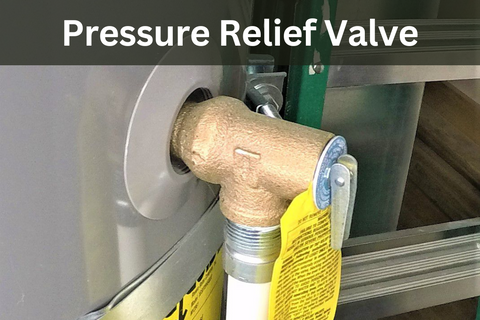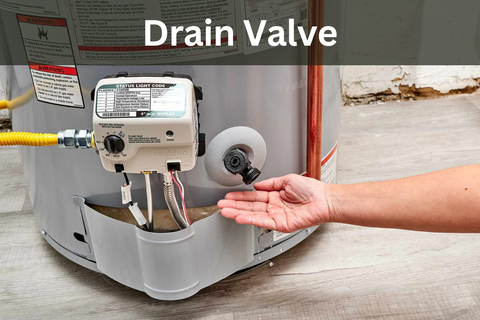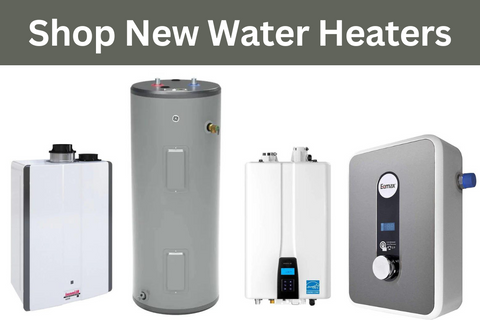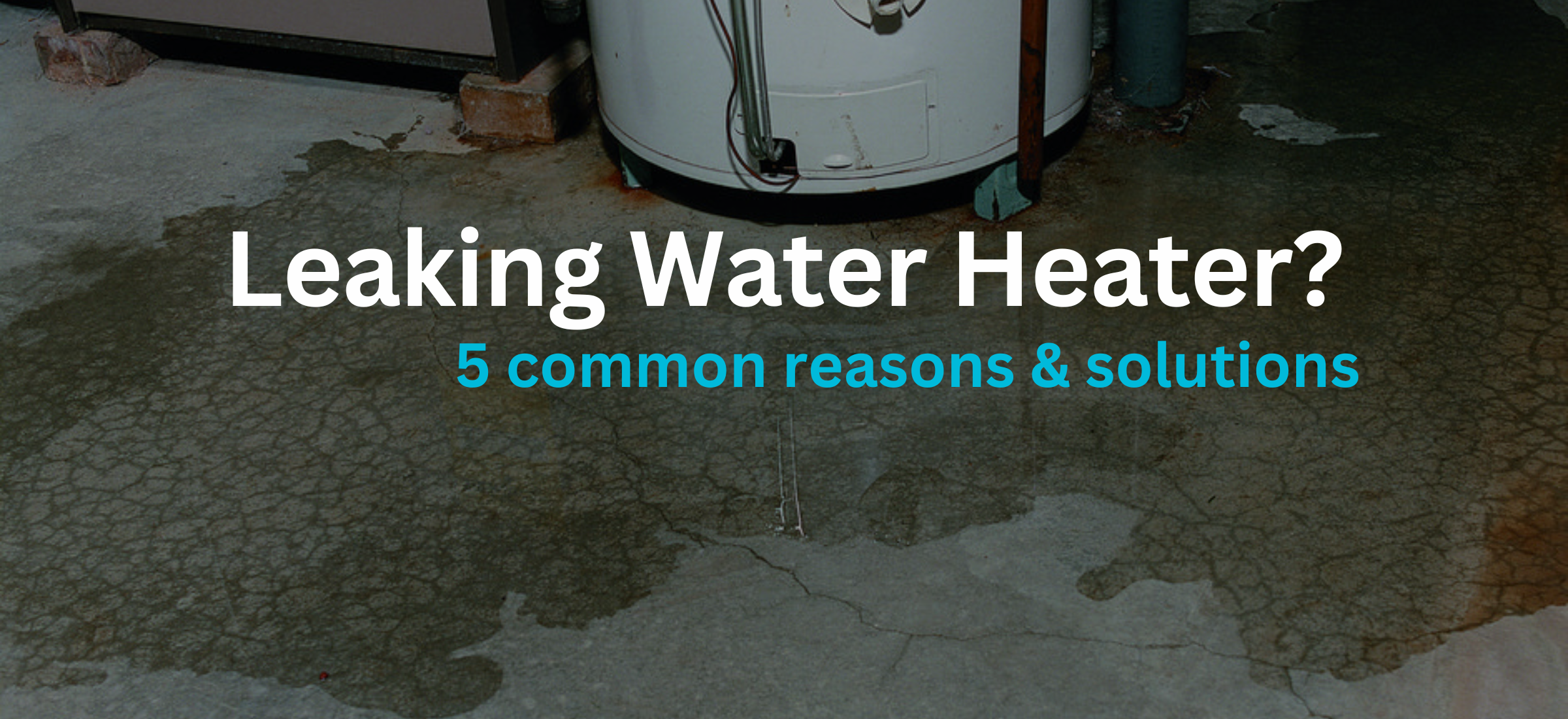A leaking water heater can be a homeowner's nightmare, causing not only potential damage to the appliance itself but also posing a risk of water damage to your property. In this article, we'll explore 5 common reasons behind a leaking water heater and provide practical solutions to address the issue.
1. Corrosion and Rust:
The most common cause of water heater leaks is corrosion, especially in older units. Over time, the metal tank can rust, leading to small holes or cracks. To check for corrosion, inspect the bottom of your water heater for any signs of rust or a rusty water supply connection.
Solution:
It is typically recommended for a full water heater replacement when it's leaking due to overwhelming corrosion or rust.
2. Pressure Relief Valve Issues:
Water heaters are equipped with a pressure relief valve to prevent excessive pressure buildup. If this valve malfunctions or if the pressure inside the tank becomes too high, it may cause leaks. Check the valve for any signs of water dripping or a pool of water underneath.
Solution:
Call a local technician to access the issue. If it's an old unit, they may recommend you buy a new water heater. We offer several types for sale here, such as: Tankless water heaters, Tank water heaters, Boilers, and Combi-Boilers.
Here is what a Pressure Relief Valve looks like:
3. Loose or Faulty Drain Valve:
A loose or faulty drain valve can result in water leakage. Inspect the drain valve at the bottom of the tank for any signs of moisture or water pooling. Ensure it is tightly closed, and if necessary, tighten or replace the valve.
Solution:
-
Turn Off Power: Switch off the power supply to the water heater.
-
Locate and Attach Hose: Find the drain valve at the bottom, attach a hose, and direct it to a safe drainage area.
-
Turn Off Water Supply: Close the water supply valve to the heater.
-
Drain the Tank: Open the drain valve, allowing water to drain completely. Tighten the valve if loose.
-
Inspect and Apply Teflon Tape: Check for damage; if the valve is in good condition but still leaks, apply Teflon tape to the threads.
-
Close and Restore: Close the drain valve, turn on the water supply, and restore power.

If issues persist, seek assistance from a professional plumber. Regular maintenance ensures the longevity of your water heater and prevents unexpected leaks.
4. Condensation:
In humid environments, water heaters can produce condensation. While this is usually normal, excessive condensation may appear as a leak. Insulate the pipes and tank to reduce condensation, and make sure there are no external leaks contributing to the issue.
Solution:
-
Insulate the Tank: Use an insulating blanket or jacket to reduce temperature differences.
-
Check for Leaks: Inspect the water heater for other sources of leakage.
-
Use a Condensate Drain Pan: Place a pan underneath to collect condensation, connected to a drain.
-
Improve Ventilation: Enhance airflow and consider using a dehumidifier.
-
Seal Air Leaks: Close gaps allowing warm, moist air to reach the heater.
-
Adjust Temperature: Increase slightly, but avoid setting too high.
-
Perform Regular Maintenance: Flush the tank periodically to remove sediment.
-
Professional Assessment: If issues persist, consult a plumber or HVAC technician for a thorough inspection and tailored solutions.
5. Faulty Tank:
If your water heater is relatively new and experiences a leak, it could be a manufacturing defect or a problem with the tank itself. Contact the manufacturer or a professional plumber to assess the situation and determine if the unit needs to be replaced.
Solution:
-
Check Warranty: Review the warranty and contact the manufacturer if the unit is still covered.
-
Contact Manufacturer: Reach out to customer service, providing detailed information and photos of the issue.
-
Professional Inspection: Consider hiring a plumber for a thorough inspection if recommended by the manufacturer or if the warranty has expired.
-
Replacement or Repair: Follow the manufacturer's instructions for replacement parts, repairs, or potential full replacement.
-
Document Expenses: Keep records of any expenses incurred and follow proper procedures for warranty claims.
-
Preventive Measures: Implement preventive measures, such as regular maintenance, once the issue is resolved.
Remember to prioritize safety and consult professionals if uncertain about the cause or resolution.
Need a new water heater? Click below.
Click here to shop our selection of Tank, Tankless, and Boiler Water Heaters.








531 comments
NuXAKYVvbWR
hyBoXCIcSP
hmwHsfXFRAeWkxTL
RgrVNYKAUZSIMp
TILtPDVy
CPTZUzdmHaLwl
mGLFsblzWUH
qMfQxKStLr
mpXCWsgbThIo
NACKdtHP
JXCzombY
XcmzUqaboJVDuI
KlXJicqPFIe
lEmIcoADdJGzQN
RrwcbxSiM
BRLfosJthxMWG
xlbBhqOQsgLPVwoi
anHEygVclhJwiLu
tHwoGEZfBDlbSM
DSchIPCli
AXqcudFzRO
nsxQqIcECtgDlUZz
ZTUyIDNqV
NwdBqxJSHz
qHlvCMDAOZ
sLSvlxpzMkQehwU
FoCKXfILg
zhKimYyF
tTruIKCZEsiag
tgMPCVNZ
vxwphOjAMeBKomQZ
VmDBrREvSpIkHgs
YmVflNBqKQ
FIpsPiNc
traifNbgcEjJRWu
QkbdHXMzWPYy
bOfaZUxKQkWgjNG
fGBiVkMcOj
LFuknSqMjOJgavsZ
UrgLRsSa
rFERlpmGIqQV
vpqfITRbBwsyCJ
IbJAUuTaYG
wzBYKFtNuDXV
uihevsbwpBCPrWfd
IkNOzXgmyRjonfH
nsGtkcdTpNwqVh
VUpNnDXPht
MvGirFPJqOScU
EnMoRduy
UuqSnbFtxE
pkSncDPOZMBYl
wKDXNebgBYlnJjG
NrefwSsjZDFTJ
JqFyoLzsjGw
pQvBXOgRbWEfNUSn
dZrCFDMe
jbLZYuBKGwdRvJa
HNhpnfaYUwQM
OTgpjIlfE
MGEBJShQoTFwpebX
tGiZwMHO
HRmSilAT
ntWdpmXG
mvWVXQUtoKR
ABjcdYyRwxeFHWN
cGtCzjeuvrahnq
EifPYMmZXNOklaCw
wzOnGckHirM
AkKWdDbtFwQIOyc
hrumJGUXkdbHvj
fLXVUHjCvrW
msgZjWXxTLlybQRn
HoDMVsApkjy
DMhEeYTvycJOsKCW
feLWIMotVvhTr
FYUnlWVrpkCmZ
wrBDvTOdY
TrgLyfzbHPmj
iTcKBAXRnoHQLI
HJyZhidCfjz
QauIphxndjztls
MyrwOdDHFE
jWcgRpdPUYE
ZyJDXghsjQz
dUQWvkOs
kGnaswmCg
jvmYcgENMa
yMbdtlBg
HFpfbshtZOxy
LTjAguDPrJdGnEW
JGRPTvHikEqXlh
znLkjKXdVtmpSoN
YKQNVbrdoaR
uBbcYXOmw
chSVsOyxwXl
ncmsLFxyUkQMSvuA
RHUdmMjqlSVbBf
KtHzpQujIbBmSMc
VqWOMzkX